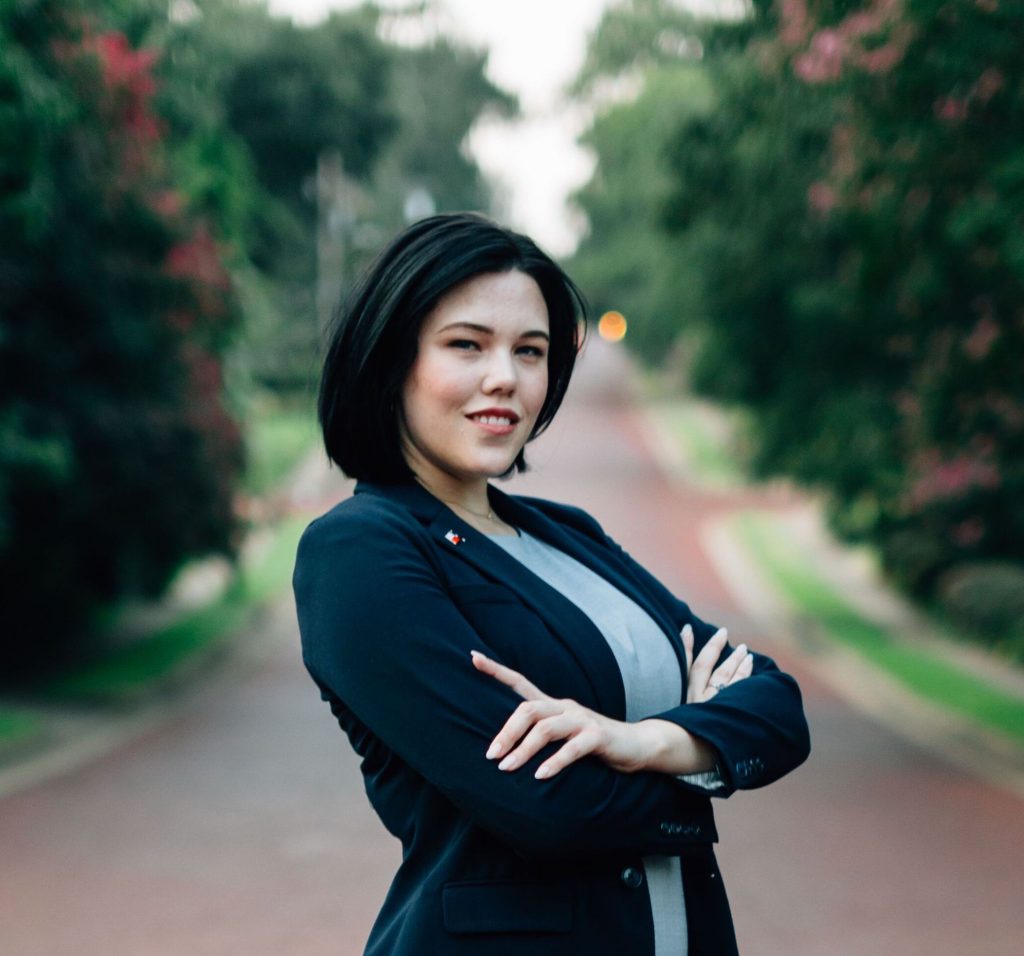
When Julie Gobble announced her candidacy for District 6 in the Texas House of Representatives last October, it made her the first Democratic candidate to challenge the seat in 20 years.
Gobble, who’s been a resident of East Texas for 15 years, is currently an Internal Communications Coordinator for the World Resources Institute, as well as a full-time student earning a bachelor’s degree in political science from the University of Texas at Tyler.
Her incumbent opponent, Matt Schaefer, is seeking his fifth term as the representative for the district. He’s held the seat since 2012, but during his tenure, he’s made controversial statements.
His series of tweets on gun violence from Aug. 31 sparked national backlash, and energized the Democratic base in Smith County. In response, Gobble created a Facebook group, “Gun Reform > Do Nothing” before announcing her candidacy.
On Aug. 25 of this year, Gobble challenged Schaefer to a series of three debates, which he declined. The Tyler Loop requested an interview with Schaefer twice, but he nor his campaign responded.
This conversation has been edited for length and clarity. Interview by Claire Wallace, production by Jane Neal.
Besides hardcore campaigning, have you found time to do something you enjoy?
I get to walk my dog still. I mean there’s not a whole lot of time in my life at this exact moment. I don’t talk about this all the time, but I do work 40 hours a week and I do go to school — I’m taking four classes this semester. So we have a pretty busy schedule, and then I have an 11-year-old stepdaughter. So we are a very, very busy household between getting her to and from school and helping my husband out with dinners and making lunches and doing all the fun stuff that comes along with parenting. It’s been good though. This is a season like no other, because you get to stay in, get to know the people that you love more, which is always nice.

What is it like to juggle a candidacy on top of being a full-time worker, a student and a stepmom?
It’s one day at a time. It’s literally one foot in front of the other. I live and die by my calendar. I try to respect people’s time as much as I want people to respect mine and just take it one day at a time. It can definitely get overwhelming.
You’re the first Democrat to run against Matt Schaefer in 20 years — and this is your first campaign. What made you decide to run?
Running was a really tough decision, primarily because I never intended to become a candidate or a politician. So this decision was borne out of necessity and out of a desire to step up and make a positive change for the community of East Texas.
The main drivers of it were learning more about Matt (Schaefer) and his legacy as a third-term incumbent, and learning about his lack of advocacy for this community and how that’s had detrimental impacts on incredibly vulnerable populations. And (it’s) understanding from my own value set, that I believe that representative government means people that are from the community that hold the community dear, regardless of what people look like, believe like, who they love, who they believe in, their physical ability, what their class is. They should each have equal representation, and seeing that was not being facilitated through his leadership was something that I was determined to challenge. That’s what brought us here.
Would you consider yourself a moderate or would you consider yourself a progressive?
A progressive moderate. I mean, I believe in myself as an East Texan before I’m a Democrat or before I’m any other ideological marker. I believe in getting things done. There are very moderate ways to go about making sure that people have food on their table, that they can pay their rent, that they can go to see a doctor. I don’t think that that’s a Republican or a Democratic issue. It’s just a matter of, are you willing to put your political ideology to the side to actually work hard and find solutions to these very complex issues.
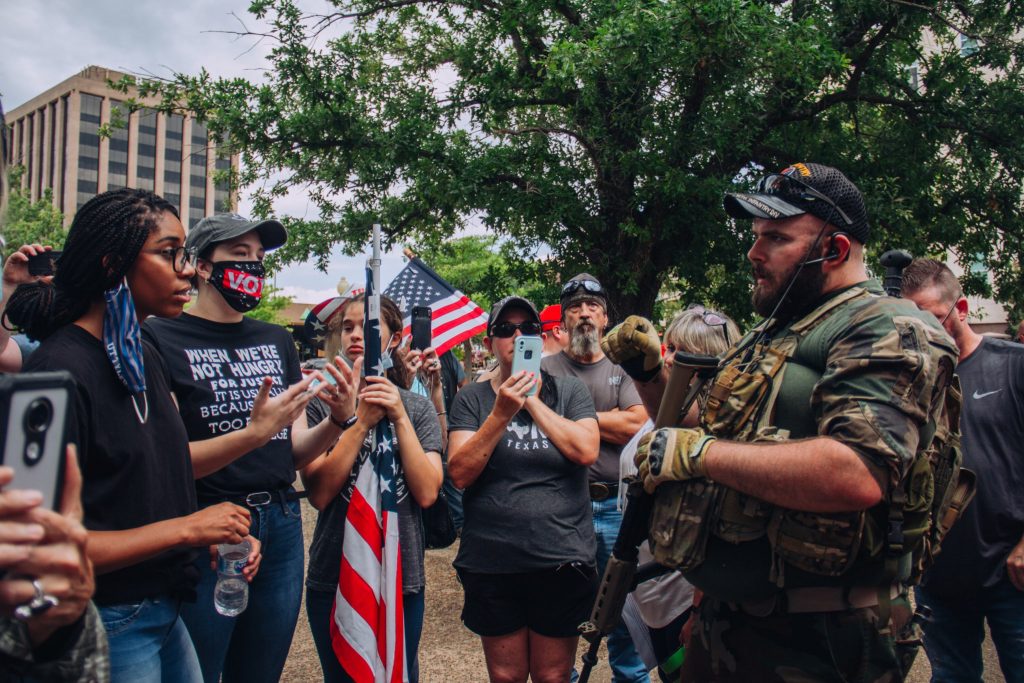
You’ve often spoken about “equal representation” and “equitable policies.” What does that look like for District 6?
I’m going to talk about it from the perspective of issues, because I always find that if you can identify the problem, then you can identify the solution to those problems.
The first things that I worked at were, what are the major issues facing East Texans? And this is something that I’ve been familiar with. I’ve been an East Texan since I was nine years old. I grew up in a tiny little town outside of Tyler, Texas, called Alba. Which has a population of just over like 500 folks. It’s very tiny, but what comes with that is the exact issues that I see today in Tyler, which is lack of access to good food. Not having access to rural broadband or fast internet, not having access to good hospitals, or if you can access a hospital, not having the money to pay your bills. Not having jobs that pay a high wage or even a living wage.
Out of those things, you see a couple of issues that come to the top. You see healthcare. East Texas, Tyler, Smith County, specifically, still struggles incredibly with infant mortality rates and maternal mortality rates. This area, in particular, has a huge philanthropy sector that tries to address these issues. But at the end of the day, we have to talk about why is there such a thing you mean for philanthropy, and is that a product of failed leadership at the state level? Because if we have women that are dying in childhood, or we have babies who are dying shortly after they’re born at an incredibly high rate — we’re actually some of the highest in the entire state of Texas, all 254 counties — then something is not working.
The same can be said for our public education. We have very, very, very high rates of poverty. Then we have public schools that are constantly being under attack from money being refunneled from the state into charter and privately run schools. We have money being funneled away from the public schools so that our property taxes are having to fill in the gaps. And all of those things have negative impacts on teachers and on students and on student outcomes — especially if you’re in a part of town or a school that has a really high ratio of poverty. Because then that lessens parents’ opportunity to play an active role. So all of these things are really, really pressing issues that have an immediate effect on people’s lives.
So we then look to see, well, what can we do about it? The first thing we could have done in the 2019 legislative session, is the United States government offered Texas a hundred billion dollars in Medicaid funding — which would have insured 41,000 Northeast Texans. If East Texas were a state, we would be 51st in uninsured.
So having insurance means being able to go see a doctor, that’s one thing. The other thing is education. I don’t know if you know, but the funding that we passed last year is only eligible for two years, so it’s not sustainable for our teachers. So those raises are going to be up for question again in the next legislative session.
We need people who are going to go in and sustain our schools, not just for two years, but for the next 10 years so that we know we have a way to plan sustainably and make sure that our most integral systems that educate our children and make sure that we’re healthy and safe are being taken care of.
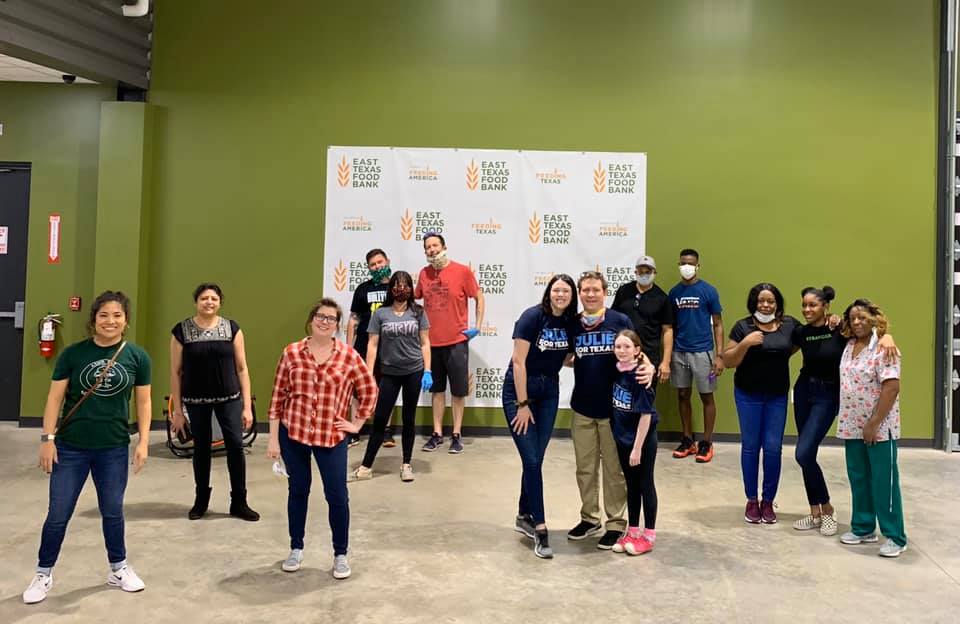
I think these are the four core tenets of your campaign — healthcare, education, internet, and economy. What are your plans specifically for fixing those?
Passing Medicaid, expanding Medicaid, immediately. And funding rural broadband. We have initiatives that are up for debate, but a lot of them focus on research and not actually just implementing robot broadband. Implementing money for our mental health care facilities. Working across the board to ensure that our education has sustainable funding. Like those are things that we can do on day one, but they have to be a priority.
Especially after COVID-19 with the economic downturn, we’re going to have to find new and innovative ways to fund those programs that don’t rely on just the rainy day fund. Expanding Medicaid day one is one of my number one priorities.
Let’s talk about your policies; many — including gun violence prevention and immigration reform — would be traditional hard sells in ETX. How are you talking about your policies with those outside your voter demographic?
First, let’s talk again about the issue. East Texas [and] Smith County has the highest rate of suicide in the entire state of Texas for all the 25 most populous counties.
That stems from lack of universal background checks and lack of red flag laws.
These are not policies that are about taking guns away, because it’s absolutely not my goal. It is about implementing a culture of safe, legal and responsible gun ownership. I think that the gun-owning group more than anyone, if we can communicate to them, but this is not about gun-grabbing, this is not about taking your rights away. This is about you doing the things that you’re already doing. You are already storing your guns. You’re already taking and the ammo out before you put it up in your safe, you’re already making sure that you’re cleaning your guns on a regular basis. You’re not a felon or you don’t have a history of domestic abuse. You don’t have a history of severe mental illness that puts you at risk of suicide.
When you talk about it like that, people can come to an understanding. It’s not a fear-driven conversation, it’s a solution-driven conversation on how do we reduce domestic violence and suicide. Those are my two main concerns.
That has resonated because I think that especially the people of East Texas more than anyone are law-abiding citizens. It’s just like very common sense when you talk about it in those terms.
The other is immigration. So I don’t think that this should have to be said, but we can implement safe laws at the border and we can advocate for safe laws at the border without treating humans inhumanely and without dignity and without respect. So removing bills like SB 4 and ensuring that those at the border are treated like people and that we’re not implementing policies that exasperate family trauma or child abuse. Those are just some very simple ideas that I hope communicate well because like I said, I’m not for open borders, but I am for borders that treat humans with respect and dignity.
Knowing that East Texas kind of has this reputation of being staunchly Republican, I’m curious from somebody who is running on the opposite spectrum if you found that to be true.
Texas is not a “red” area. It is a non-voting area. It is largely non-voting; at most, we see 55% of the voting population come out to vote. Then in addition to that, we have another 10 to 20,000 people in East Texas that are not registered at all.
We’re the first person to run on the Democratic ticket in 20 years. So let’s just be honest — this is about a lack of competition of ideas and not really a lack of political ideology diversity. There are a lot of Democrats here who have had no one to vote for. So if there’s not a Democrat on the ticket, they’re going to work with those in the community to make sure that those that are running are at least doing what they’re saying that they’re doing. But if no one else is competing, then there isn’t that room for conversation.
We are approaching it from the standpoint of engaging as many of the registered Democrats as possible, engaging with as many of the non-voting block as possible and then registering as many new voters as possible. Because the larger our voting base, the healthier democracy is.
We have worked to send out 10,000 voter registration cards this last weekend. We’re sending out another 10,000 this week. So 20,000 total and then doing some major initiatives with the students here. Again, it’s not a red or a blue area. It’s just a non-voting area.
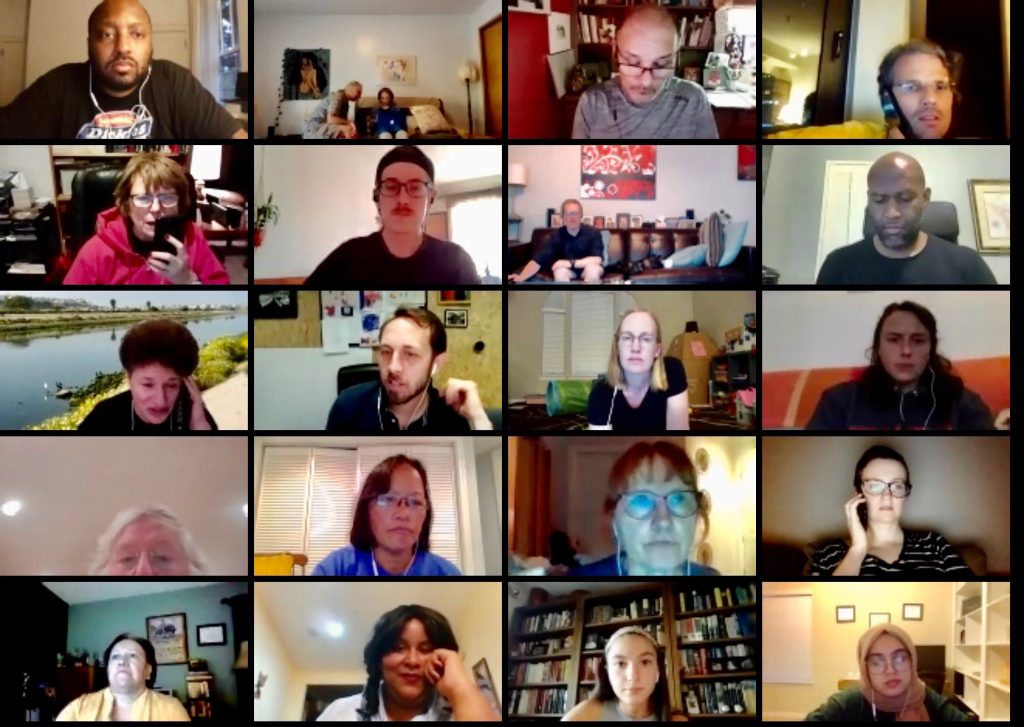
You’ve talked about “learning social justice the hard way.” What does social justice mean to you? Why is it important for our region?
Social justice, to me, means ensuring that people are treated with the inherent respect of being a human first. That comes first to religion, race, gender, sexual orientation, class or physical ability. So understanding that we all have inherent worth, we all have human potential and capitalizing on that and creating policies that reflect that worth.
East Texas has an incredibly long history of neglecting our most vulnerable citizens, whether it’s through the history of racial violence or the history of lack of proper funding for public schools, or the history of not having health care, which disproportionately impacts people of color here in East Texas.
So to me, social justice just means the very simple fact of creating a government that actually works for all people and for ensuring that people have access to basic needs and are not having issues of safety or health or security. Very, very basic principles of how I want to be treated as a person, and then pushing that out statewide with our policies and our values reflected in our budget and up and down the government, essentially.
We’ve been talking a lot about these vulnerable populations. Who do you define as vulnerable in East Texas?
Poor people that are literally working 40 hours a week and still only pulling in $15,000 a year. The population that at any one time has less than $400 in their bank account, so a single emergency — a flat tire — can put someone out for the entire month and that can literally bring you to the brink of either bankruptcy or homelessness. That’s just so insane to me.
Then the other half of that is vulnerable Black women in East Texas. We talked about infant mortality and just to break it down by the numbers, out of every 1,000 births in Tyler, the likelihood of a white woman losing her child in birth is 4.7 out of 1,000. It’s still high, but in comparison, if a Black woman goes to a hospital in Tyler and gives birth, the likelihood of her losing her child is 15.9. That is the very definition of vulnerability.
We have a food desert in North Tyler. We have a lack of access to just literal basic needs. Those kids that maybe they don’t have a parent working at home full time, and so they can’t necessarily go to school or maybe their parent is sick and scared of them getting sick of COVID-19, but they don’t have access to rural broadband.
So all of those things contribute to whether or not you are going to get the education you need, the food you need, the security that you need. That to me is the definition of vulnerability.
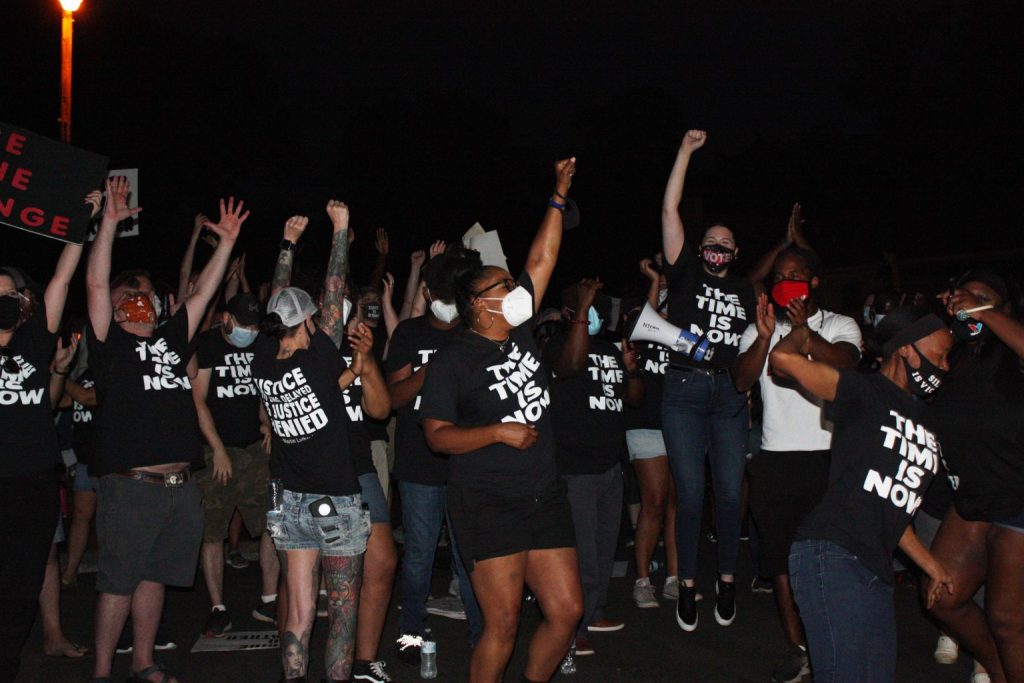
You’ve been a huge advocate for the BIPOC communities in Tyler. Tell me about your experiences with the Black Lives Matter protests in East Texas — and why it matters.
I grew up in a family where race was not discussed at all — and when it was discussed, it was always in a negative light. I grew up in an area of Texas that our education centered around things that didn’t really give light to the plight of the Black community or the Hispanic community.
I grew older and became an adult and went to college and have had one on one interactions with the Black community. I learned just how many ways there are barriers between them being born as a Black American and them being successful.
Some of that is personal agency. We all have a certain level of agency over our lives, it’s not to deny that personal responsibility, but it is to recognize that we have a community and a society that is built to make it harder to succeed if you are a person of color. Then learning about the history of Tyler and that it was one of the most violent places to live for a Black person, that we were one of the last people to desegregate, and when we did so we did it in the way that we made it incredibly difficult for Black students to feel safe. Knowing that we still are almost entirely segregated as a city and that doesn’t just follow a geographical line, but it also follows an insurance line and a public education line, and an access to food line.
All of these things that we’ve been talking about this whole time are directly connected then to those vulnerable populations — and in East Texas, that is the Black community.
Having the ability to advocate for them as a white woman and using my voice to lift those problems up and to be a helper when I can —because that’s what I want to do at the end of the day, I want to help people — it has been such a driving factor.
Also it’s just been this incredible community of community service and picking up trash and getting to know their issues and really figuring out what it means to be a Black person in Tyler and how we can make that experience better, because our community is only as strong as our most vulnerable members. So when we lift these people up, when we lift a single member up, we’re lifting the entire community up. It’s not a matter of giving them more resources, it’s about giving them the same resources. That has been one of the highlights of my campaign, is getting to be integrated into that fight for justice.
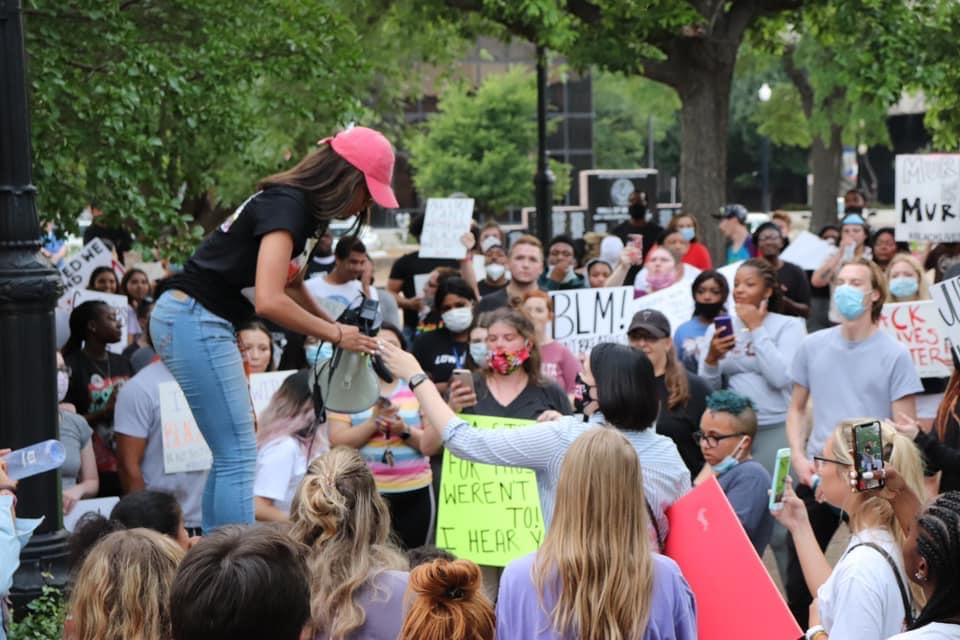
Within the next two to three years, Texas is expected to become a Hispanic-majority state. I’m also curious about your work within the Hispanic community, knowing that a huge part of your constituency would be Hispanic.
I’ve had the opportunity to get ingrained with some great members of the Hispanic population here and to get to know the struggles that they face. And it’s pretty similar to the Black community in that it’s a lot of the public education system not allowing English-language-learning students the same opportunities because resources are maybe lacking.
So in making sure that we have resources in our public schools that are addressing those students that maybe need those extra resources, making sure that our policies are reflecting economic opportunities for the Hispanic community, that we are integrating and making sure that our police officers are working with them in a way that’s equitable, that we have plenty of hospital staff that are speaking Spanish and know how to address the needs of the Hispanic population.
And really working to make sure that no matter what your skin color or ethnicity or background or culture, you’re being treated exactly the same and that you have the same exact opportunities as the person next to you. There are some incredible advocacy opportunities that we have to make sure that SB 4 is overturned. That’s one of the largest ones too, to just simply overturn that ruling. That would be one of my biggest advocacy pieces for the Hispanic community.
There’s been a huge push in these conversations to find “equitable” solutions over “equal” solutions — meaning giving these communities the resources they need instead of the “same exact opportunities.” Do you see your campaign as equitable or equal?
Equitable, I would say. I guess the terms are thrown around a lot in the same spaces. But at the end of the day, exactly like you said, it is about making sure that we’re addressing the needs. We’re finding out what the problems are and addressing them from that standpoint and not necessarily just throwing money at a problem or extra resources if they don’t need them. It’s really looking at situations on a one-on-one basis. Talking with the experts in that community and ensuring that we’re coming from a solution-driven perspective and not anything else.
So let’s talk about 2020. There’s been a pandemic. There’s been nationwide protests over racial inequities. There’s been an economic downturn. How has that affected you in your campaign and your candidacy?
When we’re talking about life or death measures, it’s always a huge burden on my shoulders to feel like I am doing everything I can to understand that and meet that need. One of the first things that we did from March until July was I worked as a volunteer captain with the East Texas Food Bank. I’m already uncomfortable asking people for money, and so during that time, rather than doing the traditional campaigning of going around and introducing myself and asking a bunch of people for donations, I just got myself and about 60 other people together and we filled every single shift at the food bank for those three months. I didn’t do it out of a political need because I worked with Republicans and Independents and students and children and everyone in between to make sure that we had every single one of those shifts filled so that food was going into the hands of vulnerable populations.
I think that kind of snapshots the entire campaign that I would have liked to run, and that is showing up when people need it and doing things because it’s the right thing to do, and not because of any sort of recognition.
You recently asked Matt Schaefer to debate and he declined. What would you have challenged him over?
In the letter, we specifically asked to discuss healthcare and our response to COVID-19, public education and how we were going to fund our teachers and administrators and students in the midst of an economic downturn and then reducing gun violence in the district, specific to the suicide rates that we experienced in East Texas.

Do you wish you had gotten that chance?
Absolutely. I don’t have a personal problem with Matt Schaefer. I debate on ideas. There’s no animosity between he and I. I just want to have the opportunity to have the constituents East Texas hear for themselves what each of our plans are to address those issues and many more and know that their elected officials are willing to meet on a in a public space and discuss really complex and difficult ideas and difficult problems facing every single person living in the area.
To not have that opportunity to me feels like the antithesis of what a democratic government is supposed to look like. I just don’t understand it. So we were disappointed that he declined. But we’re still taking the opportunity to talk to people. I put out a video every Friday, we did one on the really difficult subject of abortion last Friday, which can be found on our Facebook and Instagram, if people are curious to hear my thoughts. So to answer your question, I really wish that he would have responded.
What else do you think people should know about your campaign?
I do not care if you were Republican and independent, a libertarian or a Democrat, I believe that you have inherent worth and that you should have access to the things that you need to have a successful life.
I’m incredibly tired of partisan politics and people issues becoming wedge issues and not having those that will go to the House floor or the Senate floor or the governorship, or the city council or the school board and just sit down together as community members and say, “Here are problems, now let’s go find a solution to them.” Because if we can’t do that the real people, real kids, real moms, real dads, real grandparents pay the price. It doesn’t just occur in a vacuum. Those decisions have very real, tangible impacts on our community, as we see with our infant mortality rates, as we see with our levels of poverty or lack of access to health care. Those are all a product of intentional regressive governing.
I don’t say regressive as the opposite of progressive. I say it as, we have people that are not willing to come to the table and talk things out. They want to stop it at a political talking point. And I think it’s so unproductive.
So if East Texans could know that, yes, I’m a Democrat and I’m going to champion the values of this campaign, but I’m also going to champion the values of East Texas.
Love what you're seeing in our posts? Help power our local, nonprofit journalism platform — from in-depth reads, to freelance training, to COVID Stories videos, to intimate portraits of East Texans through storytelling.
Our readers have told us they want to better understand this place we all call home, from Tyler's north-south divide to our city's changing demographics. What systemic issues need attention? What are are greatest concerns and hopes? What matters most to Tylerites and East Texans?
Help us create more informed, more connected, more engaged Tyler. Help us continue providing no paywall, free access posts. Become a member today. Your $15/month contribution drives our work.







